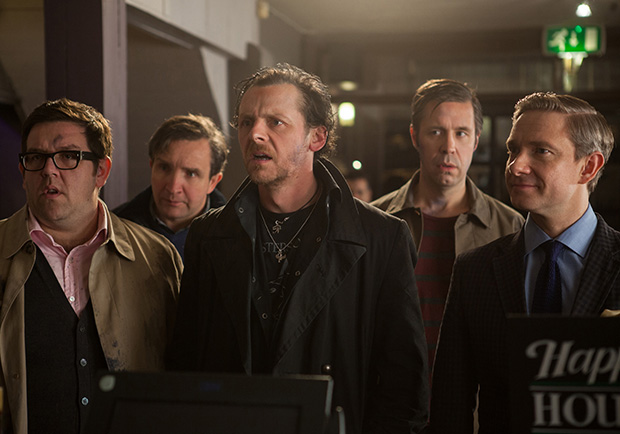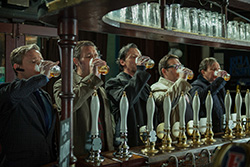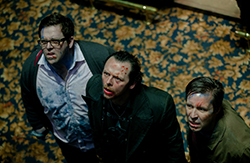The world made it past December 21, 2012, and countless other forecasted doomsdays before that. But fascination with end-of-all-things disaster remains a pop culture staple. Whether by zombies, viral contagion, robots or Rapture, the final act in earth's story is more popular than ever as big-budget fodder for Hollywood.
There's a lot to ponder about the why of this trend, and earlier this summer, our own Alissa Wilkinson wrote an insightful piece on the matter, suggesting that these sorts of films might serve as a coping mechanism for a jittery "BREAKING NEWS" culture ever more expectant of imminent danger and disaster. Apocalypse escapism is somewhat counterintuitive: because we know the world could fall apart at any moment, maybe we seek visualizations of it to preemptively ease the trauma. And this sort of helps explain the rise of apocalyptic comedies, like 2013's This is the End. As Wilkinson writes, "You don't have to stay awake at night worrying about the end of the world if you can just make jokes about it when it gets here."
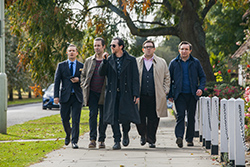 Laurie Sparham / Focus Features
Laurie Sparham / Focus FeaturesEdgar Wright's The World's End is the latest example of this. The film follows a group of five men in their 40s who return to their suburban U.K. hometown, Newton Haven, to attempt an epic pub crawl ("The Golden Mile") culminating in a final pint at the aptly named The World's End. Led by ringleader and alcoholic Gary (Simon Pegg), whose former best friend Andy (Nick Frost) is now a teetotaler and insists on drinking water rather than beer, the group tries to rekindle their old camaraderie by attempting the pub crawl they failed to finish in their teenage years.
Drunken antics and hilarity ensues, as does—you guessed it—the world's literal end. As the "five musketeers" move from pub to pub and pint to pint, they realize something is majorly askew in Newton Haven. The town is ground zero for some sort of robot or alien invasion. Think The Stepford Wives meets Invasion of the Body Snatchers.
The World's End is part three of Wright, Pegg, and Frost's so-called Blood and Ice Cream Trilogy, so named because each film features a cameo by a different flavor of Cornetto ice cream (a brand popular in the U.K.). Like The World's End, the other films in the trilogy—Shaun of the Dead (2004) and Hot Fuzz (2007)—are irreverent comedic twists on established Hollywood genres (zombie and buddy-cop films).
Like the other two films, The World's End has raucous fun with genre (in this case, sci-fi/apocalypse) while also semi-seriously exploring themes of male camaraderie. The "boys' night out gone awry" plot of The World's End affords some opportunity to explore the importance of friendship between men, even while it doesn't get too serious about it.
The tension between irony and earnestness, between amusing jokes and human insights, is a common and tricky one in comedy, especially in those narratives that aspire to rise above Hangover-grade frat gags. The World's End definitely tries to toe this line, and it's better for it. However, the blending of outrageous comedy and weighty themes can also risk trivializing the latter. In this case, the film flirts with the theme of alcoholism semi-seriously here and there, but it ultimately reduces to a "don't judge me for getting hammered at a time like this!" joke.
From the opening credits we see that Gary is an alcoholic—and also a lonely, stuck-in-the-past screw-up who still dresses and acts like a 17-year-old. Alcohol is quite literally the only thing he's got. His friends—Andy primarily, and only really in one scene—try to steer him off the path of self-destruction, but in the end they don't seem to care much about what he does with his life or why. The film advocates the message that "all you really need is good friends," but good friendship here looks mostly like drinking a lot while fending off blue-blooded robot/aliens.
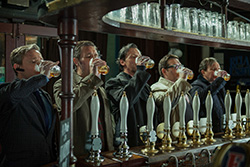 Laurie Sparham / Focus Features
Laurie Sparham / Focus FeaturesEven as the world crumbles around them, Gary continues his quest to drink a pint at The World's End. Other characters go after love interests. Gary goes after beer. And in the end, everybody seems to get what they want. But has anyone grown in the process?
The overarching ethos of The World's End can be summed up in a bleepable phrase uttered several times in the film: "Aw, f— it." It's a celebration of apathy, slacker-hood, and the "freedom to be a f— up." At the end of the world, it's the posture of a shrug. While it's not quite the nihilism of Lars von Trier's Melancholia—which depicts the destruction of earth as the greatest grace ever bestowed upon its hopelessly loathsome inhabitants—it is of a similar spirit.
It's perhaps notable that the "Blood and Ice Cream Trilogy" (aka "Three Flavours: Cornetto") is a pseudo homage to Krzysztof Kieslowski's "Three Colors" trilogy, inspired by the three colors (blue, red and white) of the French flag. In some ways The World's End feels like a skewering of the French tendency to wallow in existential misery and misanthropy in the face of finitude. As Roger Cohen wrote recently in TheNew York Times, reflecting on the "bracing frankness" and malaise of France, "No nation internalizes as completely the notion that in the end we are all dead."
The World's End, owning its Britishness and inborn obligation to diss the French at any opportunity, argues that the world's end should not be met with existential dread or boring philosophizing, but rather with a cheerful toast between mates. This isn't to say Brits are happier or more optimistic than the French; they just prefer not to get all fussy and dreary about their misery. Longtime New York Times London correspondent Sarah Lyall recently described the U.K. as "the land of the pursuit of not-miserableness," observing that "after enough Britons respond with 'I can't complain' when you ask them how they are, you begin to feel nostalgic about all those psyched Americans you left behind."
In the end, though, the current hunger for end-of-world narratives goes beyond French, British, and American postures of existential malaise. Perhaps it's reflective of a bigger trend: an embrace of humanity's messiness and "authentic" brokenness. The "just leave me be in my imperfection" mentality pervades the narratives of pop culture, with its endless array of screw-ups and amusingly broken antiheroes. It's a world where consensus on moral ideals and subsequent claims they may lay on our lives (to become some agreed-upon notion of a good person) is suspicious at best.
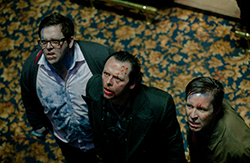 Laurie Sparham / Focus Features
Laurie Sparham / Focus FeaturesMaybe that's one reason apocalyptic films have captured the zeitgeist. Without a trustworthy metanarrative or compelling vision of the good life to instill in us hope and spur growth, we almost long for the end. Our directionless YOLO presentism is on some subliminal level a drag. As Douglas Rushkoff argues in Present Shock, our infinite present makes us long for endings (like zombie films): "We invent origins and endpoints as a way of bounding our experience and limiting the sense of limbo." The apocalypse offers a way out of the unbounded, aimless now. Arrested development is fun on T.V., but a sad way to live. Just ask Gary in The World's End.
Is it old-fashioned of me to long for the days when the heroes of our stories actually wanted to survive the apocalypse? Is it naïve to hope that even in the midst of our hyper-awareness of ubiquitous brokenness, we might still admire and seek to emulate the stories of people growing, learning, and striving to be better?
It probably is naïve. But the Christian hope and stubborn belief in both the possibility and necessity of transformation has always seemed that way. It's still worth believing.
Caveat Spectator
The World's End is rated R for language, which is ubiquitous in the film. There are seemingly hundreds of uses of the f-word in the film. There is also a fair share of violence, but none of it is too explicit or bloody (unless you consider blue robot goo "blood"). Constant alcohol consumption in the film, and a generally cavalier attitude toward drunkenness, should also give parents pause.
Brett McCracken is a Los Angeles-based writer and journalist, and author of the books Hipster Christianity: When Church and Cool Collide (Baker, 2010) and Gray Matters: Navigating the Space Between Legalism and Liberty (Baker, 2013). You can follow him @brettmccracken.

